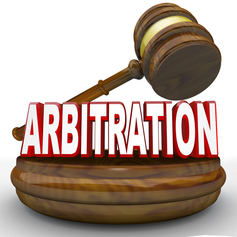Employment Arbitration in California
Below are some of the important things that you need to know about binding / mandatory arbitration of employment disputes in California.
- Arbitration is an out-of-court hearing of a dispute, which is heard and ruled on by an arbitrator - an experienced attorney or a former judge, who was hired privately by the parties to conduct arbitration. Generally, this process is quicker and more simple than filing and handling a case in court.
- One of the main reasons that more and more companies have their employees sign employment arbitration agreements is because unlike with jury trials, the chances of an arbitrator hitting the employer with a significant emotional distress or punitive damages award in a case are much lower. It's the jury of "regular" people who are known to react emotionally to certain bad acts by employers and to show more compassion toward an employee who claims to have been discriminated, retaliated and/or wrongfully terminated. This translates into larger awards and this is far less likely to happen with the arbitrator - a former judge or a seasoned attorney. This difference may or may not come into play in a particular case, depending on the facts of that case.
- Not all arbitration agreements are valid. In fact, a whole body of law has been developed that can help determine whether any given arbitration agreement is actually valid and enforceable. Many binding arbitration clauses are found unconscionable and unenforceable. The so-called Armendariz case is still the leading case on determining the validity of employment arbitration agreements.
- Arbitration is a private proceeding. The employer shall pay all the arbitration costs except the initial filing fee, that both parties pay just as they would when filing a case in court.
- Arbitration awards are almost impossible to appeal, even if the arbitrator commits an obvious mistake. Therefore, it's really, really worth making sure that you choose the right arbitrator for you - an arbitrator who is known (1) not to be biased toward the employers; and (2) actually knows employment law and doesn't have to learn the basics of the law that applies to your case to just prepare for your case. Remember, unlike in jury trials, in arbitration one person decides your case, so it's really worth doing the research on arbitrators and making sure that you don't agree on selecting the one that's known for favoring employers.
- For answers to five commonly asked questions about arbitrations, please listen to the recording blow:
